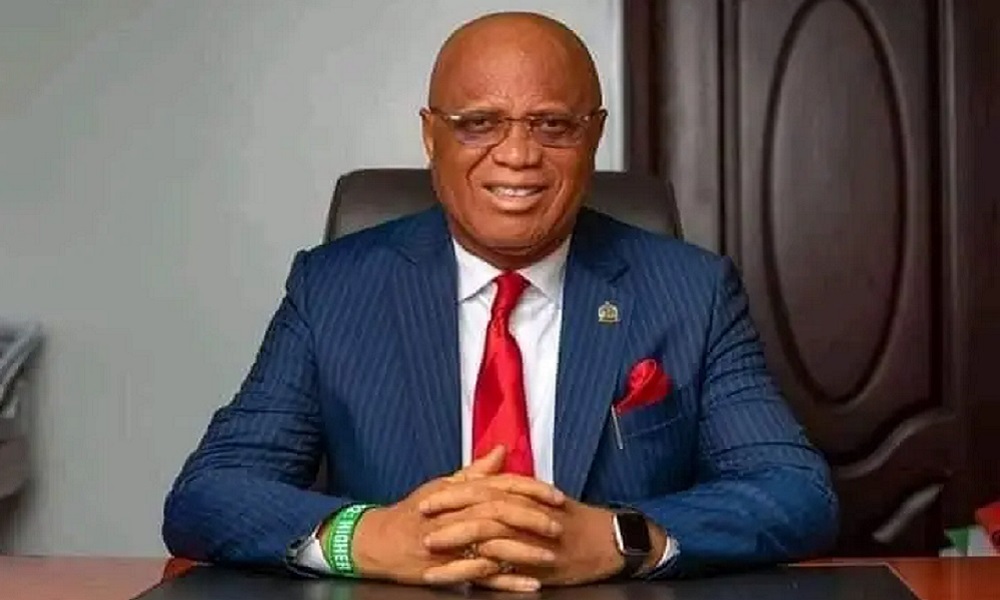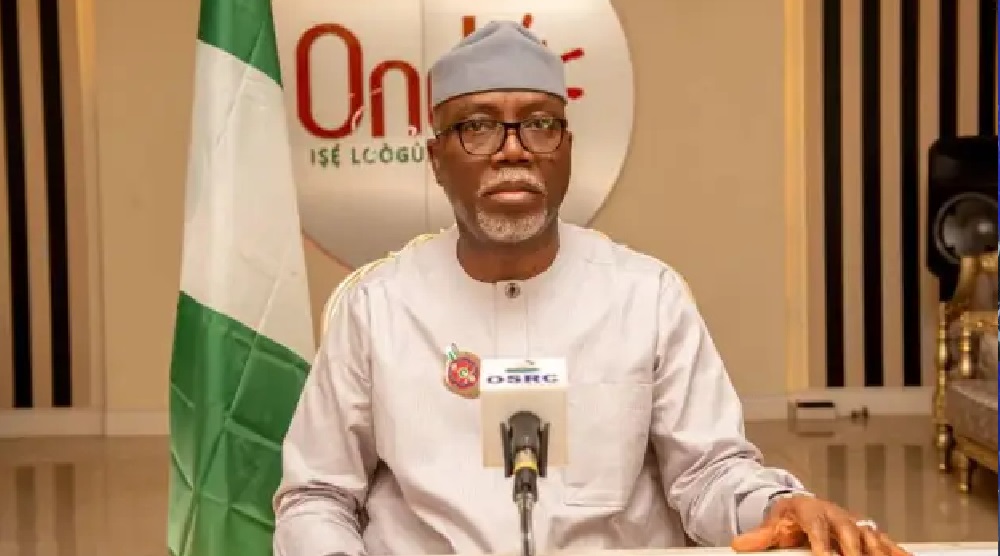News
Money goes to them directly,’ Nigerian governor denies tampering with LG funds

Governor Umo Eno of Akwa Ibom State, South-south Nigeria, has denied interfering with funds meant for local government areas in the state.
He, however, said he was interested in knowing what local councils do with the money.
“I stand here to say I have not interfered with their businesses. As their money comes, it goes to them, but we also want to know what they do with the money, that is the only thing we do.”
Mr Eno stated this last week at Uyo Township Stadium while delivering his first-anniversary speech.
“The chairperson of the Association of Local Governments of Nigeria (ALGON) is here. But they’ve been doing their work. We just ensured we worked with them to ensure they deliver on their mandate,” the governor said.
Funds meant for local government areas in the Federation Account are channelled to them via state and local government joint accounts, where governors have controlling powers over the amount of money that should be released to the local councils in their states.
The practice, which has existed for decades, has prevented local governments from functioning as an independent tier of government and has triggered calls for local government autonomy.
But Governor Eno, who just marked his first year in office, claimed “he allowed local governments to run on their own”.
“Their money goes to them directly,” Mr Eno said. “We just ensure we work with them, to make sure they deliver on their mandate,” he added, suggesting that the third tier of government is not completely independent of his control.
Mr Eno made the statement a few days after the federal government filed a suit at the Supreme Court against the 36 state governments. The suit is seeking the enforcement of full autonomy for the 774 local government areas in the country.
The plaintiff in the suit – the Office of the Attorney General of the Federation and Minister of Justice – is asking the court to issue an order preventing state governors from embarking on unilateral, arbitrary, and unlawful dissolution of democratically elected officials at the local government areas.
It also prayed the court to make an order permitting funds standing in credits of local governments to be paid to them directly from the Federation Account in line with the provisions of the Constitution as against the “unlawful” joint accounts created by the governors.
Some states in the country, including Akwa Ibom, at the expiration of the tenure of the elected council officials, set up a caretaker committee to oversee the affairs of the council pending when elections would be conducted.
Governor Eno’s administration has just extended for six months the tenure of the caretaker administration in the local government areas in Akwa Ibom.
In the suit, the Minister of Justice, Lateef Fagbemi, among other requests, is asking the Supreme Court to stop governors from further setting up caretaker committees at the local government levels in violation of the constitutionally recognised democratic system.
Mr Fagbemi further prayed the court to issue an injunction restraining governors, their agents and privies from receiving, spending or tampering with funds released from the Federation Account for the benefit of local governments where no democratically elected officials exist in the areas, PREMIUM TIMES reported.
The local government, as a third tier of government, is meant to cater for the people at the grassroots, but the performance of the local leaders is generally poor across the country because of the overbearing influence of state governors who tampers with funds meant for them, a development that has crippled governance at the grassroots.
Former President Muhammadu Buhari, in December 2022, accused state governors of pilfering funds meant for local governments.
The Nigerian Senate last December urged the federal government to stop the allocation of funds to local governments run by caretaker committees.
PREMIUM TIMES has reported how state governors fought against a move by the Nigeria Financial Intelligent Unit to abolish joint accounts where governors exercise powers over funds meant for local governments.
Because the Akwa Ibom governor, like his counterparts in other states, has great influence over the election or appointment of local political leaders, local council officials are always reluctant to publicly admit that the governor tampers with funds meant for local councils.
People familiar with how the state and local government joint account in Akwa Ibom is being operated said the state government has been taking credits for many projects executed with the local government funds.
The Akwa Ibom State Government, for instance, takes credit for free education at the primary school level even when local government funds are used to pay the salary of primary school teachers.
The state government also takes credit for purchasing SUVs for paramount rulers in the various local government areas of the state, even when the money for such purchases is deducted from the local council’s funds.
Also, the state government appoints members of the Local Government Service Commission, whose salaries are paid with local government funds. The functions of the commission include the recruitment, promotion, and transfer of local government workers.
We gathered that these monies are deducted during the meeting of the joint account, after which whatever is left is then shared with the local government councils.
A council official, who preferred to be anonymous, said that “generally acceptable deductions” are made during joint account meetings.
“The money they deducted – centrally, (are) for payment of local government teachers’ salaries, pensions and gratuities. After all these payments, including traditional rulers and some other things, what is left is what they hand over to you.”
The official said the practice began during the administration of former Governor Godswill Akpabio (now Senate President), where Victor Antai (now Executive Director, Project NDDC) served as commissioner for Local Government and Chieftaincy Affairs.
“Members of ALGON moved a motion that because some local governments are insolvent – for example, the number of primary schools in Uyo Local Government Area, the funds that come to Uyo will not be able to pay teachers entitlements.
“They moved a motion that all local governments be taken into consideration. For instance, a place like Esit Eket Local Government Area that has huge allocation but with very few bills to pay will have too much excess money, while Uyo and Ikot Ekpene local government areas will not have.
“So, they put (allocations of the 31 LGAs in the state) in a pool, use certain indices to make sure that every central payment is being handled at the state level, including salaries, pensions and gratuities of primary schools teachers, local governments staff members and traditional rulers as would have been paid by the local governments.
“They remove it at (the) source and pay directly to prevent a situation where some local governments would pay while others do not. It is after all these deductions that they now tell you that after these deductions, this is what is left, and they now handed it over to you to run your council,” the official said.
“It is not given on an equal basis. There are certain indices because what also comes in is not equal,” the official said when asked if what is left is shared equally by local governments.
The sharing strategy, as explained by the council official, suggests that the practice of lumping the federal allocations accruing to the 31 local governments in a pool for central deductions places local government areas like Uyo and Ikot Ekpene in an advantageous position.
The two local government areas, apparently non-oil producing, do not get as much money from the federation account as some local government areas in the oil-rich Akwa Ibom.
However, these two cities are densely populated and enjoy more revenues from businesses than other local governments, particularly those in rural areas, which do not, a development that renders the practice of making general deductions from the pool a disadvantage to other local government areas.
Also, as stated by the official, Uyo and Ikot Ekpene local government areas have the largest number of primary schools as well as teachers population, making payment of salaries a burden to them, particularly when the state government takes credit for free education at primary school level but uses local government funds to pay teachers entitlements.
News
Galatasaray technical director opens up on nature of Osimhen’s contract

Galatasaray technical director Okan Buruk has confirmed the presence of a clause in Napoli’s Victor Osimhen loan deal.
Buruk explains that the January clause in Victor Osimhen’s contract allows the player to explore opportunities with various interested clubs during the January transfer window.
This statement came during an interview on the official website of the Turkish champions, where Buruk discussed various topics related to the team.
During the interview, Buruk explained that Osimhen would like to stay at Galatasaray until the end of the season.
He noted that although there is a transfer clause in force, the player has expressed his intention to stay at the club, which he reiterated from the beginning of his arrival.
He stated, “Osimhen wants to stay here until the season is over and he has said this consistently. Although there is a clause regarding January transfers, ultimately it is the player’s decision and he feels committed to staying.”
Reflecting on how the club secured Osimhen’s services, Buruk shared: “I traveled to Milan when I had the chance. Because I lived there for three years, I feel comfortable there. We didn’t talk about football during my visit; instead, we enjoyed dinner together for two days, which helped foster a good relationship. After a match against Adana Demirspor, we had a video call at the airport to discuss the options, and after careful consultation with our transfer committee and the president, we completed the transfer.”
Osimhen joined Galatasaray on the final day of the summer transfer window after negotiations with Chelsea and Al Ahly failed to materialize. He quickly adapted to his new surroundings and made significant contributions with eight goals and four assists in just nine appearances in all competitions.
Eaglespath
News
Ondo: Gov Aiyedatiwa says he’s not aware of vote buying on his behalf

Ondo State Governor Lucky Aiyedatiwa has stated that he was not aware that his political associates bought votes on his behalf.
This is coming a few hours after he emerged victorious in all the 18 local government areas of the state.
According to report, the incumbent governor and candidate of the All Progressives Congress, APC, was accused of vote-buying after his victory in the November 16 election.
However, speaking in an interview with Channel TV on Sunday night, the governor noted that the oppositions are using the vote-buying allegation as an excuse for their loss.
“I’m not aware of such. The opposition will want to say that to make excuses for their failure, but for us, it is what we worked for; the people have spoken through their votes.
” There won’t be any reason to buy votes because Ondo people know what they want. I’m not aware of people buying votes on my behalf.”
News
Uncovered! World Bank exposes $32m missing funds in Nigeria’s water project

In Nigeria’s water project, the World Bank has discovered $32 million in undeclared payments.
The banks recently released their FY2024 Sanctions System Annual Report, which included this information.
According to the study, the lost monies were meant to improve Nigeria’s water infrastructure but were not properly accounted for, which led to an intervention to protect the project’s integrity.
“INT followed up on risks identified regarding a project in Nigeria’s water sector and flagged to operations the risk, which was associated with $32 million of unaccounted funds.”
The World Bank worked with the project team, which included the operations manager, financial management expert, and task team leader for Nigeria, in an effort to retrieve the money.
While $6 million is still in the project account to cover expected operating costs, the Central Bank of Nigeria has requested reimbursement of $22 million.
Please don’t forget to “Allow the notification” so you will be the first to get our gist when we publish it.
Drop your comment in the section below, and don’t forget to share the post.
-

 News10 hours ago
News10 hours agoPolice arrest 2 suspected cultists with arms in Edo
-

 News7 hours ago
News7 hours agoKwankwaso cries out, says there are plots to colonise north
-

 News11 hours ago
News11 hours agoOndo Guber: Tinubu Tells PDP, Others; Go To Court If Dissatisfied
-

 News11 hours ago
News11 hours agoGunmen abduct NDLEA officer, orderly in Delta
-

 News8 hours ago
News8 hours agoHonoring Excellence: Dr. Olotu Otemu Akpodiete JP – A Beacon of Inspiration for GCU Class of 92
-

 News10 hours ago
News10 hours ago‘I’ll never accept any female’s award again’ – Bobrisky blames Eniola Ajao for his problems
-

 News7 hours ago
News7 hours agoTinubu fires DG names replacement (photos)
-

 News10 hours ago
News10 hours agoChidimma Adetshina named Miss Universe Africa, Oceania








